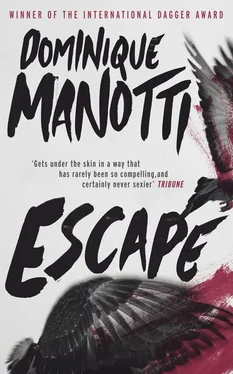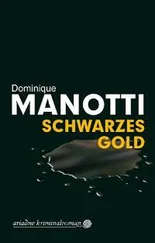Dominique Manotti - Escape
Здесь есть возможность читать онлайн «Dominique Manotti - Escape» весь текст электронной книги совершенно бесплатно (целиком полную версию без сокращений). В некоторых случаях можно слушать аудио, скачать через торрент в формате fb2 и присутствует краткое содержание. Год выпуска: 2014, ISBN: 2014, Издательство: Arcadia Books Limited, Жанр: Криминальный детектив, на английском языке. Описание произведения, (предисловие) а так же отзывы посетителей доступны на портале библиотеки ЛибКат.
- Название:Escape
- Автор:
- Издательство:Arcadia Books Limited
- Жанр:
- Год:2014
- ISBN:9781909807747
- Рейтинг книги:4 / 5. Голосов: 1
-
Избранное:Добавить в избранное
- Отзывы:
-
Ваша оценка:
- 80
- 1
- 2
- 3
- 4
- 5
Escape: краткое содержание, описание и аннотация
Предлагаем к чтению аннотацию, описание, краткое содержание или предисловие (зависит от того, что написал сам автор книги «Escape»). Если вы не нашли необходимую информацию о книге — напишите в комментариях, мы постараемся отыскать её.
Escape — читать онлайн бесплатно полную книгу (весь текст) целиком
Ниже представлен текст книги, разбитый по страницам. Система сохранения места последней прочитанной страницы, позволяет с удобством читать онлайн бесплатно книгу «Escape», без необходимости каждый раз заново искать на чём Вы остановились. Поставьте закладку, и сможете в любой момент перейти на страницу, на которой закончили чтение.
Интервал:
Закладка:
Filippo spends hours wandering disconsolately around Paris, haunting the smartest and most expensive neighbourhoods. He strolls around, nostrils quivering, sniffing out sensations and chance encounters. He likes telling himself he is free to invent his life.
Place Vendôme. He walks around the square, lingering before each shop window. This is the home of Paris’s most famous jewellers. He’s never been particularly interested in jewellery — he prefers perfume. He stops outside Guerlain. On the other side of the glass, a tall woman has her back to him. A customer. He’s mesmerised by her mass of coppery hair, pulled back into a precariously perched chignon, artificially casual, held in place by two big wooden hair slides. He stares at her intricate curls, dreams of caressing the wisps of hair on the back of her neck, of removing the slides one at a time, then burying his face in the cascade of flaming hair finally set free. The woman turns towards him. She has sprinkled a drop of perfume on the back of her hand and inhales it deeply. She hesitates, appears to be considering, takes a few steps, her eyes half-closed, then returns to the counter. She is Italian, he’s certain from the way she holds herself, walks and smiles. She picks up a bottle and holds it out to the sales assistant behind the counter. Mitsouko — he recognises the shape. In Rome, he had once furtively peddled dozens of cut-price bottles on the streets around Termini station. He loves little details that resemble echoes, or like signposts mapping out his path. Luciana’s coppery hair in the mountains and that of the stranger in Place Vendôme; the bottle of Mitsouko on the Rome streets and at Guerlain.
The woman finishes paying and emerges from the shop. An Italian with coppery hair, that perfume. Don’t stop to think, go for it .
He walks over to meet her, bows to her, grasps her hand and gives it a ceremonious kiss, without being over-insistent. He says to her in Italian: ‘Mitsouko, unless I’m mistaken. An excellent choice.’
She laughs, surprised and amused. Her eyes are amber like her hair. She replies in Italian: ‘Yes, of course, Mitsouko. How clever! And how do you know that I’m Italian?’
‘Your entire body speaks Italian.’
She cocks her head to one side, with a half-smile. She likes the expression. Filippo continues talking slowly, moving on a few steps.
‘Actually, to be completely honest, I’ve been looking for you in Paris for days…’ She follows close behind. Encouraging. ‘…I needed you, your elegance, your warmth. I’ve written a book, I wrote it for you, to make you look at me, listen to me, walk beside me, as you are doing now…’
By now they have crossed the entire Place Vendôme. It’s in the bag. He stops. ‘…and so that you’d agree to have a drink with me.’
She stops too, and laughs.
‘Around here? Out of the question. The Ritz is full of the wrong kind of people. Rue de Rivoli? Swarming with tourists.’
She hesitates for a moment, torn between curiosity and prudence.
‘Why don’t we go to my place instead? I live around the corner — just above the Tuileries gardens. I’ve had a busy day. When you tried to pick me up…’
‘I’m not trying to pick you up…’
‘Oh really! When you tried to pick me up, I was on my way home. I’d love to go home. It’ll be peaceful, I’ll make you a tea, and you can tell me about your books.’
When they reach the fifth floor she rummages in her bag. He waits while she finds her keys, opens the door and goes inside. He follows. It is a precious moment; he savours the invitation to enter her private world. Before him is a large, sparsely furnished room, airy and spacious; opposite, three French windows that must open on to a south-facing balcony. The sun filters through the closed louvered shutters, which she does not open. A magnificent, dark, highly polished wood floor, white walls, a few items of glass-and-steel furniture around a dining table. A sitting area with squat leather armchairs on steel frames, and a coffee table at the base of a vast bookcase that covers an entire wall.
‘Sit down and I’ll make the tea.’
She vanishes through the left-hand door into the kitchen. So the bedroom must be off to the right. He sits down, tense, on the alert for the slightest sound, the slightest indication of her presence. She moves around in the kitchen, opens a cupboard, closes it. A sound of cups rattling, water running, then a silence. What is she doing? The water boils. She comes back carrying a tray with two cups and a china teapot on it. She has kicked off her shoes and is walking barefoot on the dark wood floor. He watches her, fascinated by her relaxed manner. He desires her, his throat tight, his muscles paralysed. She sits down facing him and pours black tea into the two cups. He takes a sip of the scalding brew, rises and goes to kneel beside her, removes a slide from her chignon and the edifice slowly collapses — the second slide and her hair cascades down her back. She does not resist, her eyes are closed. He bathes his hand in the silky, slightly damp mass, the scent of warm amber. Can a person die of desire? He stands up, and gathers her in his arms. She is light, and he walks towards the bedroom door, which yields at his touch. In the half-darkness, he makes out the shadowy shape of the bed in the centre of the room, covered in a voluminous white duvet. He lowers her into the hollow of this whiteness and with infinite tenderness leans over towards the face, the mouth, the hair that he has always desired.
He has the beginnings of a story.
18 July
Vicenzo had warned her that things might not move very fast and that academics had no sense of urgency. In July the notion of time is even more elastic. And the long weekend of the 14th of July slows communication down still further. After several phone conversations and a few long explanations, it is only on coming home from work on the evening of Monday 18th July that Lisa finds a package in her letter box. It contains a charming handwritten note from Jacques Chamrousse, professor of contemporary economic history at a Paris university.
Dear Ms Biaggi,
As I said to you over the telephone, I am not an expert on the history of Italian banking. While trying to find the answers to your questions, I came across this book, a history of the Piemonte-Sardegna bank, published to celebrate its centenary, so naturally it has all the drawbacks of this type of publication. But I was able to verify that it is a fairly reliable study, based on numerous established facts, and I hope it contains the information you are looking for. If it doesn’t, don’t hesitate to contact me again and I’ll see if I can find any other more ‘orthodox’ works. It is an Italian publication, there is no French edition, but of course that won’t be a problem for you.
Yours sincerely,
Jacques Chamrousse
Lisa climbs the stairs to her apartment, the book under her arm, and settles down comfortably to skim through it. A beautiful edition with photos of starchy bankers, luxurious offices, lavish, formal commemorations. In 1949, a takeover of the Tomasino family bank, the biggest bank in Brescia and the region. Not a word about its fascist past, but that was only to be expected. The most interesting contribution of the Tomasino bank is its property portfolio, the jewel of which is the building housing the Milan branch of the bank, at number 10, Via Del Battifolle, Milan. What a shock … That address … The very one where Carlo was assassinated. And opposite the article, a full-page photo of a magnificent art deco building, in which the bank only occupies part of the ground floor. It was there, on that pavement … Shock makes Lisa burst into tears. She places a trembling hand on the photo, closes her eyes and waits, without moving, until she feels calm again. There is no such thing as chance: this is proof.
Читать дальшеИнтервал:
Закладка:
Похожие книги на «Escape»
Представляем Вашему вниманию похожие книги на «Escape» списком для выбора. Мы отобрали схожую по названию и смыслу литературу в надежде предоставить читателям больше вариантов отыскать новые, интересные, ещё непрочитанные произведения.
Обсуждение, отзывы о книге «Escape» и просто собственные мнения читателей. Оставьте ваши комментарии, напишите, что Вы думаете о произведении, его смысле или главных героях. Укажите что конкретно понравилось, а что нет, и почему Вы так считаете.












